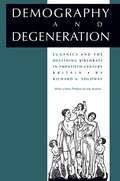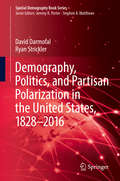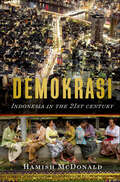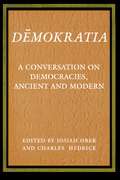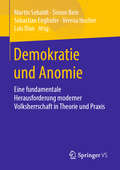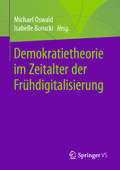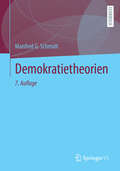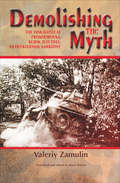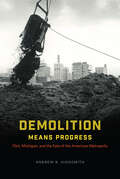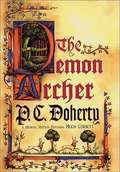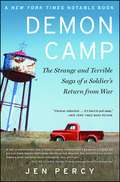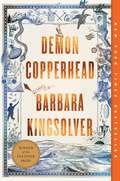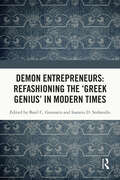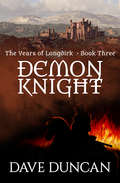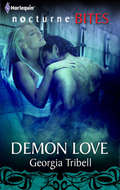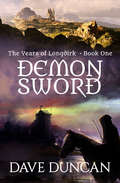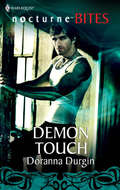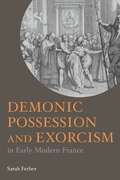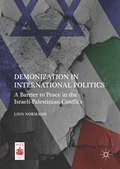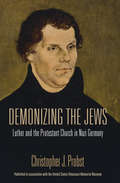- Table View
- List View
Demography and Degeneration
by Richard A. SolowayRichard Soloway offers a compelling and authoritative study of the relationship of the eugenics movement to the dramatic decline in the birthrate and family size in twentieth-century Britain. Working in a tradition of hereditarian determinism which held fast to the premise that "like tends to beget like," eugenicists developed and promoted a theory of biosocial engineering through selective reproduction. Soloway shows that the appeal of eugenics to the middle and upper classes of British society was closely linked to recurring concerns about the relentless drop in fertility and the rapid spread of birth control practices from the 1870s to World War II.Demography and Degeneration considers how differing scientific and pseudoscientific theories of biological inheritance became popularized and enmeshed in the prolonged, often contentious national debate about "race suicide" and "the dwindling family." Demographic statistics demonstrated that birthrates were declining among the better-educated, most successful classes while they remained high for the poorest, least-educated portion of the population. For many people steeped in the ideas of social Darwinism, eugenicist theories made this decline all the more alarming: they feared that falling birthrates among the "better" classes signfied a racial decline and degeneration that might prevent Britain from successfully negotiating the myriad competive challenges facing the nation in the twentieth century.Although the organized eugenics movement remained small and elitist throughout most of its history, this study demonstrates how pervasive eugenic assumptions were in the middle and upper reaches of British society, at least until World War II. It also traces the important role of eugenics in the emergence of the modern family planning movement and the formulation of population policies in the interwar years.
Demography and the Graeco-Roman World
by April Pudsey Claire HolleranThrough a series of case studies this book demonstrates the wide-ranging impact of demographic dynamics on social, economic and political structures in the Graeco-Roman world. The individual case studies focus on fertility, mortality and migration and the roles they played in various aspects of ancient life. These studies - drawn from a range of populations in Athens and Attica, Rome and Italy, and Graeco-Roman Egypt - illustrate how new insights can be gained by applying demographic methods to familiar themes in ancient history. Methodological issues are addressed in a clear, straightforward manner with no assumption of prior technical knowledge, ensuring that the book is accessible to readers with no training in demography. The book marks an important step forward in ancient historical demography, affirming both the centrality of population studies in ancient history and the contribution that antiquity can make to population history in general.
Demography, Politics, and Partisan Polarization in the United States, 1828–2016 (Spatial Demography Book Series #2)
by David Darmofal Ryan StricklerThis book examines the geography of partisan polarization, or the Reds and Blues, of the political landscape in the United States. It places the current schism between Democrats and Republicans within a historical context and presents a theoretical framework that offers unique insights into the American electorate. The authors focus on the demographic and political causes of polarization at the local level across space and time. This is accomplished with the aid of a comprehensive dataset that includes the presidential election results for every county in the continental United States, from the advent of Jacksonian democracy in 1828 to the 2016 election. In addition, coverage applies spatial diagnostics, spatial lag models and spatial error models to determine why contemporary and historical elections in the United States have exhibited their familiar, but heretofore unexplained, political geography. Both popular observers and scholars alike have expressed concern that citizens are becoming increasingly polarized and, as a consequence, that democratic governance is beginning to break down. This book argues that once current levels of polarization are placed within a historical context, the future does not look quite so bleak. Overall, readers will discover that partisan division is a dynamic process in large part due to the complex interplay between changing demographics and changing politics.
Demokrasi: Indonesia in the 21st Century
by Hamish McDonaldIndonesia, a nation of thousands of islands and almost 250 million people, straddles the junction of the Pacific and Indian oceans. Current President Susilo Bambang Yudhoyono has presided over 6 per cent average yearly growth of its economy, to surpass $1 trillion. If this rate continues, Indonesia will join the world's ten biggest economies in a decade or so, just behind the so-called BRIC countries. The much-discussed recent documentary The Act of Killing revived some of its darker past, and Barack Obama's reminiscences about the childhood years he spent there briefly shone the spotlight on a country many Americans know little about. Yet as Indonesia approaches its 2014 parliamentary and presidential elections, its future is wide open. Though the largest Muslim nation by population, it remains a receiver of wisdom from the Arab world, rather than a messenger of multi-religious tolerance. Its pursuit of trade agreements with Japan and South Korea have burnished its economic ambitions, but its diplomacy is long on so-called "soft power," and short on sanctions or force. So what does the future hold for this pivotal place? Award-winning Asia-Pacific journalist Hamish McDonald's Demokrasi is an accessible and authoritative introduction to the modern history and politics of this fascinating country.
Demokratia: A Conversation on Democracies, Ancient and Modern
by Josiah Ober & Charles HedrickThis book is the result of a long and fruitful conversation among practitioners of two very different fields: ancient history and political theory. The topic of the conversation is classical Greek democracy and its contemporary relevance. The nineteen contributors remain diverse in their political commitments and in their analytic approaches, but all have engaged deeply with Greek texts, with normative and historical concerns, and with each others' arguments. The issues and tensions examined here are basic to both history and political theory: revolution versus stability, freedom and equality, law and popular sovereignty, cultural ideals and social practice. While the authors are sharply critical of many aspects of Athenian society, culture, and government, they are united by a conviction that classical Athenian democracy has once again become a centrally important subject for political debate. The contributors are Benjamin R. Barber, Alan Boegehold, Paul Cartledge, Susan Guettel Cole, W. Robert Connor, Carol Dougherty, J. Peter Euben, Mogens H. Hansen, Victor D. Hanson, Carnes Lord, Philip Brook Manville, Ian Morris, Martin Ostwald, Kurt Raaflaub, Jennifer Tolbert Roberts, Barry S. Strauss, Robert W. Wallace, Sheldon S. Wolin, and Ellen Meiksins Wood.
Demokratie im postkommunistischen EU-Raum: Erfolge, Defizite, Risiken (Vergleichende Politikwissenschaft)
by Martin Brusis Günter Verheugen Karel VodičkaDas Buch analysiert die Lage der Demokratie in elf postkommunistischen EU-Mitgliedstaaten und in Ostdeutschland. Dreißig Jahre nach den friedlichen Revolutionen in Mittel- und Osteuropa gibt es Erfolge und Chancen, aber auch Fehlentwicklungen und Defizite, die im Kontext von europäischer Integration und Transformationsgeschichte untersucht und eingeordnet werden. Das Buch bietet allgemein interessierten Leser*innen einen strukturierten Überblick sowie vertiefte Kenntnisse zu den einzelnen Staaten und dem Sonderfall Ostdeutschland. Dieses Buch eröffnet interessante Vergleichsperspektiven und eine systematische Wissensbasis zur Demokratiequalität im postkommunistischen Raum. Gleichzeitig werden Motive, Abläufe und politische Ergebnisse der EU-Osterweiterung im Zusammenhang dargestellt und die noch zu lösenden Aufgaben beschrieben.
Demokratie und Anomie: Eine fundamentale Herausforderung moderner Volksherrschaft in Theorie und Praxis
by Martin Sebaldt Simon Bein Sebastian Enghofer Verena Ibscher Luis IllanModerne Demokratien stehen vor fundamentalen Herausforderungen. Dazu zählt das Phänomen der Anomie, verstanden als Zustand systematischen Normen- und Ordnungsverlusts. Die Studie dokumentiert die weite Verbreitung anomischer Potentiale in westlichen Demokratien, belegt aber auch deren Ambivalenz: Denn aus solchen Gefahren können auch Lerneffekte resultieren, die eine politische Modernisierung begünstigen. Auf dieser breiten empirischen Erkenntnisgrundlage unternimmt die Studie eine interdisziplinäre theoretische Erklärung dieser faszinierend vielfältigen Herausforderung moderner Demokratien.
Demokratietheorie im Zeitalter der Frühdigitalisierung
by Michael Oswald Isabelle BoruckiDie Effekte der Digitalisierung auf die Demokratie sind vielfältig. Die Einschätzungen der Debatte fächern sich von Gefahren für Demokratien bis hin zur basisdemokratischen Revolution auf, wobei die tatsächlichen und finalen Folgen derzeit kaum absehbar sind. Das Fazit beinhaltet daher die Antwort, dass wir uns noch in der Phase der Frühdigitalisierung befinden, in der lediglich Abschätzungen und eine Bestandsaufnahme möglich sind. Daher wird in dem vorliegenden Band insbesondere ein Gewicht auf die Theoriebildung gelegt, in der die Demokratietheorie einem Update unterzogen werden soll, um den Digitalen Wandel zu inkludieren. Zudem soll die Demokratietheorie dafür genutzt werden, um die stattfindende digitale Transformation zu erklären und zu verstehen.
Demokratietheorien
by Manfred G. SchmidtDieses Lehrbuch analysiert klassische und moderne Demokratietheorien. Es spannt den Bogen von der Staatsformenlehre des Aristoteles bis zur neuesten international vergleichenden Demokratieforschung. Die Demokratietheorien vermitteln tiefenscharfe Einblicke in den Maschinenraum der Demokratie. Sie erkunden die verschiedenen Demokratieformen, ihre Funktionsweise und die leistungsfähigsten Instrumente zu ihrer Messung. Die Theorien erörtern sodann, wann und wie Demokratisierungsvorhaben erfolgreich sind oder scheitern. Zudem wird in ihrem Licht geprüft, ob die Demokratien Bewährungsproben bestehen – wie den wachsenden Anteil der Nichtwähler (ein Fieberthermometer der Demokratie), die dritte Autokratisierungswelle, den Aufstieg des Rechtspopulismus und die Schwächung der Demokratie durch nichtmajoritäre Institutionen. Wie die Forschung zeigt, hat die Demokratie zwei Gesichter: eines zeugt von beträchtichen Schwächen, das andere von besonderen Stärken. Die Lern- und Fehlerkorrekturfähigkeit vor allem der liberalen, verfassungsstaatlichen Demokratien ist beachtlich – und aus dem Leistungsvergleich mit den Autokratien gehen sie als Sieger hervor. Anhand der Demokratietheorien werden schließlich die Funktionsvoraussetzungen der Demokratie und die Gefährdung ihrer Existenz genauer bestimmt. Dieses Werk ist die siebte - mehrfach erweiterte und aktualisierte - Auflage des erstmals 1995 erschienenen Buches.
Demolishing the Myth: The Tank Battle at Prokhorovka, Kursk, July 1943: An Operational Narrative
by Valeriy Zamulin&“Comprehensive scholarship and convincing reasoning, enhanced by an excellent translation, place this work on a level with the best of David Glantz&” (Dennis Showalter, award-winning author of Patton and Rommel). This groundbreaking book examines the battle of Kursk between the Red Army and Wehrmacht, with a particular emphasis on its beginning on July 12, as the author works to clarify the relative size of the contending forces, the actual area of this battle, and the costs suffered by both sides. Valeriy Zamulin&’s study of the crucible of combat during the titanic clash at Kursk—the fighting at Prokhorovka—is now available in English. A former staff member of the Prokhorovka Battlefield State Museum, Zamulin has dedicated years of his life to the study of the battle of Kursk, and especially the fighting on its southern flank involving the famous attack of the II SS Panzer Corps into the teeth of deeply echeloned Red Army defenses. A product of five years of intense research into the once-secret Central Archives of the Russian Ministry of Defense, this book lays out in enormous detail the plans and tactics of both sides, culminating in the famous and controversial clash at Prokhorovka on July 12, 1943. Zamulin skillfully weaves reminiscences of Red Army and Wehrmacht soldiers and officers into the narrative of the fighting, using in part files belonging to the Prokhorovka Battlefield State Museum. Zamulin has the advantage of living in Prokhorovka, so he has walked the ground of the battlefield many times and has an intimate knowledge of the terrain. Examining the battle primarily from the Soviet side, Zamulin reveals the real costs and real achievements of the Red Army at Kursk, and especially Prokhorovka. He examines mistaken deployments and faulty decisions that hampered the Voronezh Front&’s efforts to contain the Fourth Panzer Army&’s assault, and the valiant, self-sacrificial fighting of the Red Army&’s soldiers and junior officers as they sought to slow the German advance and crush the II SS Panzer Corps with a heavy counterattack at Prokhorovka. Illustrated with numerous maps and photographs (including present-day views of the battlefield), and supplemented with extensive tables of data, Zamulin&’s book is an outstanding contribution to the growing literature on the battle of Kursk, and further demolishes many of the myths and legends that grew up around it.
Demolition Means Progress: Flint, Michigan, and the Fate of the American Metropolis (Historical Studies of Urban America)
by Andrew R. HighsmithIn 1997, after General Motors shuttered a massive complex of factories in the gritty industrial city of Flint, Michigan, signs were placed around the empty facility reading, "Demolition Means Progress," suggesting that the struggling metropolis could not move forward to greatness until the old plants met the wrecking ball. Much more than a trite corporate slogan, the phrase encapsulates the operating ethos of the nation's metropolitan leadership from at least the 1930s to the present. Throughout, the leaders of Flint and other municipalities repeatedly tried to revitalize their communities by demolishing outdated and inefficient structures and institutions and overseeing numerous urban renewal campaigns--many of which yielded only more impoverished and more divided metropolises. After decades of these efforts, the dawn of the twenty-first century found Flint one of the most racially segregated and economically polarized metropolitan areas in the nation. In one of the most comprehensive works yet written on the history of inequality and metropolitan development in modern America, Andrew R. Highsmith uses the case of Flint to explain how the perennial quest for urban renewal--even more than white flight, corporate abandonment, and other forces--contributed to mass suburbanization, racial and economic division, deindustrialization, and political fragmentation. Challenging much of the conventional wisdom about structural inequality and the roots of the nation's "urban crisis," Demolition Means Progress shows in vivid detail how public policies and programs designed to revitalize the Flint area ultimately led to the hardening of social divisions.
Demon Archer:A Medieval Mystery Featuring Hugh Corbett
by P. C. DohertyThe death of Lord Henry Fitzalan on the feast of St. Matthew 1303 is a matter widely reported but little mourned. Infamous for his lecherous tendencies, his midnight trysts with a coven of witches and his boundless self-interest, he was a man of few friends. So when Hugh Corbett is asked to bring his murderer to justice it is not a matter of finding a suspect but of choosing between them. Immediate suspicion falls on Lord Henry's chief verderer, Robert Verlian. His daughter had been the focus of Lord Henry's roving eye in the weeks before his death and he was not a man to take no for an answer. But the culprit could just as easily be Sir William, the dead man's younger brother. It is no secret that Sir William covets the Fitzalan estate - but would he kill to inherit it? The possibilities are endless, but the truth is more terrible than anyone could have imagined.
Demon Camp: The Strange and Terrible Saga of a Soldier's Return from War
by Jennifer PercyA “chilling” (O, The Oprah Magazine), “darkly brilliant” (Bookforum) account of “the effects of war on the psyches of the soldiers who fight” (Esquire).In 2005 a Chinook helicopter carrying sixteen Special Ops soldiers crashed during a rescue mission in Afghanistan, killing everyone on board. In that instant, machine gunner Caleb Daniels lost his best friend, Kip, and seven members of his unit. Back in the US, Caleb begins to see them everywhere—dead Kip, with his Alice in Wonderland tattoos, and the rest of them, their burned bodies always watching him. But there is something else haunting Caleb, too—a presence he calls the Black Thing, or the Destroyer, a paralyzing horror that Caleb comes to believe is a demon. Alone with these apparitions, Caleb considers killing himself. There is an epidemic of suicide among veterans of Iraq and Afghanistan, men and women with post-traumatic stress disorder who cannot cope with ordinary life in the aftermath of explosions and carnage. Author Jen Percy finds herself drawn to their stories. Her main subject, Caleb, has been bringing damaged veterans to a Christian exorcism camp in Georgia that promises them deliverance from the war. As Percy spends time with these soldiers and exorcists—finding their beliefs both repellant and magnetic—she enters a world of fanaticism that is alternately terrifying and welcoming. With “beautiful, lucid” (Los Angeles Times) lyricism, Demon Camp is the riveting true story of a veteran with PTSD and an exploration of the battles soldiers face after the war is over. As The New York Times Book Review said, “Percy’s narrative may confirm clichés about war’s costs, but it artfully upsets a common misconception that all veterans’ experiences are alike.”
Demon Copperhead: A Pulitzer Prize Winner
by Barbara KingsolverWINNER OF THE 2023 PULITZER PRIZE • WINNER OF THE WOMEN'S PRIZE FOR FICTIONA New York Times "Ten Best Books of 2022" • An Oprah’s Book Club Selection • An Instant New York Times Bestseller • An Instant Wall Street Journal Bestseller • A #1 Washington Post Bestseller "Demon is a voice for the ages—akin to Huck Finn or Holden Caulfield—only even more resilient.” —Beth Macy, author of Dopesick"May be the best novel of 2022. . . . Equal parts hilarious and heartbreaking, this is the story of an irrepressible boy nobody wants, but readers will love.” (Ron Charles, Washington Post)From the acclaimed author of The Poisonwood Bible and The Bean Trees, a brilliant novel that enthralls, compels, and captures the heart as it evokes a young hero’s unforgettable journey to maturitySet in the mountains of southern Appalachia, Demon Copperhead is the story of a boy born to a teenaged single mother in a single-wide trailer, with no assets beyond his dead father’s good looks and copper-colored hair, a caustic wit, and a fierce talent for survival. Relayed in his own unsparing voice, Demon braves the modern perils of foster care, child labor, derelict schools, athletic success, addiction, disastrous loves, and crushing losses. Through all of it, he reckons with his own invisibility in a popular culture where even the superheroes have abandoned rural people in favor of cities.Many generations ago, Charles Dickens wrote David Copperfield from his experience as a survivor of institutional poverty and its damages to children in his society. Those problems have yet to be solved in ours. Dickens is not a prerequisite for readers of this novel, but he provided its inspiration. In transposing a Victorian epic novel to the contemporary American South, Barbara Kingsolver enlists Dickens’ anger and compassion, and above all, his faith in the transformative powers of a good story. Demon Copperhead speaks for a new generation of lost boys, and all those born into beautiful, cursed places they can’t imagine leaving behind.
Demon Entrepreneurs: Refashioning the ‘Greek Genius’ in Modern Times
by Basil C. Gounaris Ioannis D. StefanidisThe ‘Greek genius’ appears as the combination of two stereotypes with a long pedigree: Homer’s ingenious Odysseus, triumphing with tricks over his foes, and Virgil’s ‘deceitful Odysseus’, the impostor Greek. Adamantios Korais, the leading scholar who almost single-handedly refashioned the Greek nation, fully appreciated the importance of Greek shipping and commerce, and the wealth they generated for the spread of Enlightenment ideas and the quest for political emancipation in the Greek lands. In this context, the ‘genius’ and the consequent economic success have long been considered the essential prerequisites for the spreading of Greek education and, ultimately, national revival. Reversely, Greek education and consciousness-building via economic success are taken as proof of the immanent ‘Greek genius’. As a popular myth of redemption, this stereotype persists in a country of rather limited resources and uncertain prospects. This volume seeks to identify both the content and the ways that the ‘Greek genius’ has long worked at the political, social and economic level. Based on a collective research project, it offers an original contribution to the broader discussion generated by the current Greek national bicentenary. This book will appeal to all those interested in the idea of the Greek 'national character’ as well as international perceptions of Greek culture, education, and society during the modern era.
Demon King, Where To Escape: Volume 3 (Volume 3 #3)
by Yun JinruchuWhen the prince was born, he was in his home. The child lives and the mother dies. It was for DiShang. His father had never liked him since he was young, and when he heard that a sect in the east was recruiting disciples, he sent him on his way …
Demon King, Where To Escape: Volume 4 (Volume 4 #4)
by Yun JinruchuWhen the prince was born, he was in his home. The child lives and the mother dies. It was for DiShang. His father had never liked him since he was young, and when he heard that a sect in the east was recruiting disciples, he sent him on his way …
Demon Knight (The Years of Longdirk #3)
by Dave DuncanLongdirk, the hero of medieval Europe, faces his greatest threat. &“Duncan excels at old-fashioned swashbuckling fantasy&” (RT Book Reviews). The Scottish outlaw Toby Strangerson, known as Longdirk, has used gramarye, dark magic, to defeat the Fiend and save Europe from abject slavery—but he has also made himself the most feared and envied man in all of Italy. The hordes are reorganizing and plan to sweep over the Alps once more and retake their lost prize of power and conquest. Toby and his friend Hamish struggle to unite the quarreling city‑states into a single, powerful force to resist the invasion in a world where no ally can be trusted and traitors lurk in every shadow. But there is more at stake than freedom and the destiny of a continent. A woman&’s love is also hanging in the balance. This book was originally published under the name Ken Hood.
Demon Love
by Georgia TribellKendra Morton has trained and worked side-by-side with Thor Kensington for years, hunting the demons who come to earth from the parallel world of Torlin. Despite his dark allure, she knows him to be a cold and unbending leader. So why does her heart still race with desire every time he's near? Half-demon Thor has always wanted to be Kendra's lover, even though she's off limits. If takes an attempt on her life by a traitorous saboteur to make him act on their hidden passion. But now that he has the woman of his dreams, can he protect her from the unknown assassin…and from his own inner demon?
Demon Sword (The Years of Longdirk #1)
by Dave DuncanIn medieval Scotland, a Highlander picks up his sword against his oppressors. &“Duncan excels at old-fashioned swashbuckling fantasy&” (RT Book Reviews). All of Europe is under the control of the Khan, whose conquering armies swept across the West in 1244. Scotland, in addition, lies under the heel of England. Young Toby Strangerson, a half‑English bastard, reared by a witchwife, wants only to shed his hated &“Sassenach&” blood and free his beloved highlands. Toby wields a sword as the outlaw Longdirk. The sword can cut down men like so many stalks of corn. But stranger winds are swirling and howling across the lochs, eldritch winds that are ridden by &“hobs&” and &“wisps&” and demons. The enemy Sassenach king is also a sorcerer. His demon soul needs a body and his Black Arts can free Europe from the Khan's Golden Horde. This book was originally published under the pseudonym Ken Hood.
Demon Touch
by Doranna DurginEver since the night Alex Donally found the demon blade in his hand—and in his thoughts—he has been driven to fight evil. When he meets Deb Marchand, he feels compelled to protect her from her violent ex—and aroused by the visions of passionate encounters they both experience when they touch. The blade is showing them what they can have—if Deb can risk giving her trust and heart to a vigilante…
Demonic Grounds: Black Women and the Cartographies of Struggle
by Katherine MckittrickIn a long overdue contribution to geography and social theory, Katherine McKittrick offers a new and powerful interpretation of black women's geographic thought. In Canada, the Caribbean, and the United States, black women inhabit diasporic locations marked by the legacy of violence and slavery. Analyzing diverse literatures and material geographies, McKittrick reveals how human geographies are a result of racialized connections, and how spaces that are fraught with limitation are underacknowledged but meaningful sites of political opposition. Demonic Grounds moves between past and present, archives and fiction, theory and everyday, to focus on places negotiated by black women during and after the transatlantic slave trade. Specifically, the author addresses the geographic implications of slave auction blocks, Harriet Jacobs's attic, black Canada and New France, as well as the conceptual spaces of feminism and Sylvia Wynter's philosophies. Central to McKittrick's argument are the ways in which black women are not passive recipients of their surroundings and how a sense of place relates to the struggle against domination. Ultimately, McKittrick argues, these complex black geographies are alterable and may provide the opportunity for social and cultural change. Katherine McKittrick is assistant professor of women's studies at Queen's University.
Demonic Possession and Exorcism: In Early Modern France
by Sarah FerberThis is a highly original study of demon possession and the ritual of exorcism, both of which were rife in early modern times, and which reached epidemic proportions in France.Catholics at the time believed that the Devil was everywhere present, in the rise of the heretics, in the activities of witches, and even in the bodies of pious young women. The rite of exorcism was intended to heal the possessed and show the power of the Church - but it generated as many problems as it resolved. Possessed nuns endured frequently violent exorcisms, exorcists were suspected of conjuring devils, and possession itself came to be seen as a form of holiness, elevating several women to the status of living saints. Sarah Ferber offers a challenging study of one of the most intriguing phenomena of early modern Europe. Looking towards the present day, the book also argues that early modern conflicts over the Devil still carry an unexpected force and significance for Western Christianity.
Demonization in International Politics
by Linn NormandThis book investigates demonization in international politics, particularly in the Middle East. It argues that while demonization's origins are religious, its continued presence is fundamentally political. Drawing upon examples from historical and modern conflicts, this work addresses two key questions: Why do leaders demonize enemies when waging war? And what are the lasting impacts on peacemaking? In providing answers to these inquiries, the author applies historical insight to twenty-first century conflict. Specific attention is given to Israel and Palestine as the author argues that war-time demonization in policy, media, and art is a psychological and relational barrier during peace talks.
Demonizing the Jews: Luther and the Protestant Church in Nazi Germany
by Christopher J. Probst&“An insightful analysis of the ways in which Protestant reformer Martin Luther&’s anti-Jewish writings were used by German Protestants during the Third Reich.&” —Contemporary Church History Quarterly The acquiescence of the German Protestant churches in Nazi oppression and murder of Jews is well documented. In this book, Christopher J. Probst demonstrates that a significant number of German theologians and clergy made use of the 16th-century writings by Martin Luther on Jews and Judaism to reinforce the racial antisemitism and religious anti-Judaism already present among Protestants. Focusing on key figures, Probst&’s study makes clear that a significant number of pastors, bishops, and theologians of varying theological and political persuasions employed Luther&’s texts with considerable effectiveness in campaigning for the creation of a &“de-Judaized&” form of Christianity. Probst shows that even the church most critical of Luther&’s anti-Jewish writings reaffirmed the antisemitic stereotyping that helped justify early Nazi measures against the Jews. &“A valuable contribution to our understanding of the churches under Nazism.&” —Lutheran Quarterly &“An insightful account of the convoluted echoes and reverberations of this deeply problematic aspect of Luther&’s legacy within German Protestantism over the longue durée.&” —German Studies Review
